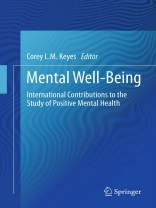This book provides a new generation of research in which scholars are investigating mental health and human development as not merely the absence of illness or dysfunction, but also the presence of subjective well-being. Subjective well-being is a fundamental facet of the quality of life. The quality of an individual’s life can be assessed externally and objectively or internally and subjectively. From an objective standpoint, other people measure and judge another’s life according to criteria such as wealth or income, educational attainment, occupational prestige, and health status or longevity. Nations, communities, or individuals who are wealthier, have more education, and live longer are considered to have higher quality of life or personal well-being. The subjective standpoint emerged during the 1950s as an important alternative to the objective approach to measuring individual’s well-being. Subjectively, individuals evaluate their own lives as evaluations made, in theory, after reviewing, summing, and weighing the substance of their lives in social context.
Research has clearly shown that measures of subjective well-being, which are conceptualized as indicators of mental health (or ‘mental well-being’), are factorially distinct from but correlated with measures of symptoms of common mental disorders such as depression. Despite countless proclamations that health is not merely the absence of illness, there had been little or no empirical research to verify this assumption. Research now supports the hypothesis that health is not merely the absence of illness, it is also the presence of higher levels of subjective well-being.
In turn, there is growing recognition of the personal and social utility of subjective well-being, both higher levels of hedonic and eudaimonic wellbeing. Increased subjective well-being has been linked with higher personal and social ‘goods’: higher business profits, more worker productivity, greateremployee retention; increased protection against mortality; increased protection against the onset and increase of physical disability with aging; improved cognitive and immune system functioning; and increased levels of social capital such as civic responsibility, generativity, community involvement and volunteering. This edited volume brings together for the first time the growing scientific literature on positive mental health that is now being conducted in many countries other than the USA and provides students and scholars with an invaluable source for teaching and for generating new ideas for furthering this important line of research.
สารบัญ
Prologue; Corey Keyes.- PART I. TOWARD AN INTERNATIONAL EPIDEMIOLOGY OF POSITIVE MENTAL HEALTH.- Chapter 1. Promoting and Protecting Positive Mental Health: Early and Often Throughout the Lifespan; Corey Keyes.- Chapter 2. Complete Mental Health in South Australian Youth: Measurement, Prevalence and Promotion; Anthony Venning, Jaklin Eliott, Lisa Kettler and Anne Wilson.- Chapter 3. The Complete Mental Health Model: The Social Distribution of Mental Health and Mental Illness in the Dutch Population.- Chapter 4. The Prevalence of Levels of Well-Being Revisited in an African Context; Marie Wissing and Michael Temane.- Chapter 5. Prevalence and Correlates of Complete Mental Health in the South Korean Adult Population; Young-Jin Lin, Young-Gun Ko, Hee-Cheon Shin, and Yongrae Cho.- Chapter 6. Positive Mental Health: Measurement,
Prevalence and Correlates in a Chinese Context; Keli Yin, Jiamei He and Yanfen Fu.- Chapter 7. The Warwick-Edinburgh Mental Well-Being Scales (WEMWBS): Performance in Different Cultural and Geographical Groups.- Sarah Stewart-Brown.- PART II. TOWARD AN INTERNATIONALIZED UNDERSTANDING OF MECHANISMS OF POSITIVE MENTAL HEALTH.- Chapter 8. Universals and Cultural Differences in the Causes and Structure of Happiness: A Multilevel Review; Ed Diener.- Chapter 9. Mental Well-Being in Iran: The importance of a Comprehensive Well-Being in Understanding the Linkages of Personality and Values; Mohsen Joshanloo.- Chapter 10. Emotional Well-Being and Self-Control Skills of Children and Adolescents: The Israeli Perspectives; Michael Rosenbaum and Tammie Ronen.- Chapter 11. The Nature of Happiness: Nature Affiliation and Mental Well-Being; Andrew Howell and Holli-Anne Passmore.- Chapter 12. Physiological Correlates of Mental Well-Being; Petra Lindfors.- PART III. TOWARD THE APPLICATION OF POSITIVE MENTAL HEALTH INTERNATIONALLY.- Chapter 13. Recovery: A Complete Mental Health Perspective; Helene Provencher.- Chapter 14. The Significance of Salutogenis and Well-Being in Mental Health Promotion: From Theory to Practice; Eva Langeland.- Chapter 15. Positive Psychology Interventions: Research Evidence, Practical Utility, and Future Steps; Dianne Vella-Brodick.- Chapter 16. Promoting Positive Mental Health and Well-Being: Practice and Policy.; Margaret Barry.-
เกี่ยวกับผู้แต่ง
Corey Keyes is a professor of Sociology at Emory University in Atlanta, Georgia. He was a member of a Mac Arthur Foundation Research Network on Successful Midlife Development, and co-chair (with Ed Diener, Don Clifton, and Martin Seligman) of the first summit of Positive Psychology in 1999. He is a senior fellow at the Center for the Study of Law and Religion, where he is a core member of the multidisciplinary project on the ‘Pursuit of Happiness’ 5-year project funded by the Templeton Foundation. He participated in the 2007 National Academies of Science Keck Future’s Initiative on The Future of Human Healthspan: Demography, Evolution, Medicine and Bioengineering. His research centers on illuminating the ‘two continua’ model of population health and illness, showing how the absence of mental illness does not translate into the presence of mental health, and revealing that the biological and psychosocial causes of true health are often distinct processes from those now understood as the causes of (or risk for) illness. This work is being applied to better understanding resilience, prevention of mental illness, and informs the growing healthcare approach called ‘predictive healthcare, ‘ which seeks to map and monitor true (physical and mental) health and to develop and apply novel responses to correct early deviations to it to maintain health and limit disease and illness. Corey is currently working on these issues with governmental agencies in England, Canada, Northern Ireland, Scotland, and with the World Health Organization (WHO) Europe, and with the Substance Abuse and Mental Health Services Administration (SAMHSA) in the USA












